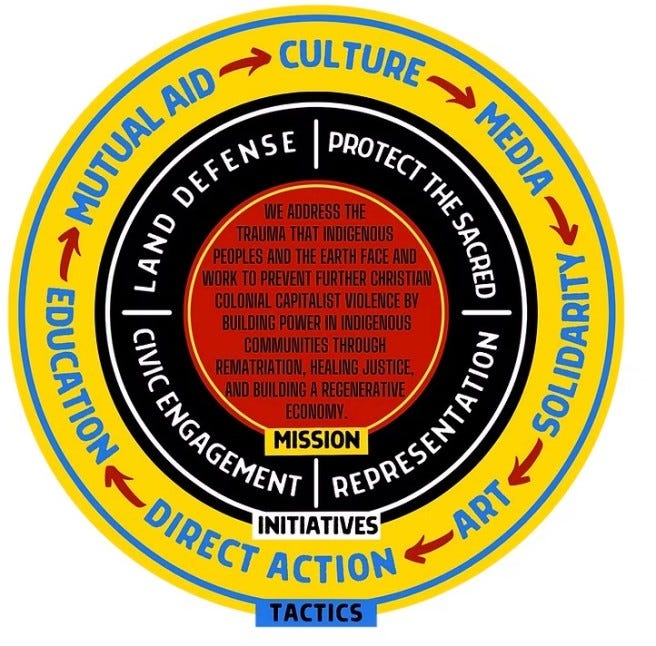Decolonial Path for Quakers 10 – Sensemaking
I recently wrote: The question is, do we continue to accept the current dominant systems of colonial capitalist violence? I believe we must stop our complacency and complicity in accepting the ongoing injustices of colonization. (from “This is the question“)
While I continue to try to express why I believe we (white Quakers) must confront historic injustices in this country, massive global change is occurring all around us. We seem to be on the brink of a perfect storm of economic, political, environmental and social collapse. The current dominant systems may not dominate much longer in the face of this.
In any country on the cusp of authoritarianism, the role of the press as an engine of scrutiny, truth and accountability becomes increasingly critical.
It feels like we have reached that point in the US.
When elected officials of the opposing party are arrested or handcuffed, when the military is deployed to quell overwhelmingly peaceful protest, when student activists are jailed and deported, and when a wide range of civic institutions – non-profits, law firms, universities, news outlets, the arts, the civil service, scientists – are targeted and penalized by the federal government, it is hard to avoid the conclusion that our core freedoms are disappearing before our eyes – and democracy itself is slipping away.
The Guardian
This multi-system collapse can be traced back to the arrival of European settlers on this land. Indigenous peoples refer to what happened as “Christian colonial capitalist violence.”
Conscientious objection
Some Friends have come to the conclusion that we must “conscientiously object to and resist capitalism and white supremacy” just as we have historically conscientiously objected to military service. To live faithfully requires us to seek and build alternatives that are rooted in our spiritual principles. The antidote includes LANDBACK, Mutual Aid, and Abolition. (See below: An Epistle to Friends Regarding Community, Mutual Aid and LANDBACK )
Symmetrical antidote
Great Plains Action Society’s Theory of Change
Midwest Friends have worked with the Great Plains Action Society’s founder, Sikowis Nobiss, in a number of ways. She spoke to us at Iowa Yearly Meeting (Conservative)’s annual sessions in 2017 about building bridges with Native people.
The Great Plains Action Society has an integrated theory of change, that includes Mutual Aid, which I was involved in for several years.
Great Plains Action Society addresses the trauma that Indigenous Peoples and the Earth face and work to prevent further christian colonial capitalist violence by fighting for and building power in Indigenous communities through reMatriation, healing justice and a regenerative economy. We believe that Indigenous ideologies and practices are the antithesis of colonial capitalism, and we deploy these tools to fight and build on our vision–tools that are deeply embedded in a culture of resistance.
Great Plains Action Society’s Theory of Change, by Sikowis Nobiss
Sensemaking
Finally, there remains the most existential risk of them all: our diminishing capacity for collective sensemaking. Sensemaking is the ability to generate an understanding of the world around us so that we may decide how to respond effectively to it. When this breaks down within the individual, it creates an ineffective human at best and a dangerous one at worst. At the collective level, a loss of sensemaking erodes shared cultural and value structures and renders us incapable of generating the collective wisdom necessary to solve complex societal problems like those described above. When that happens the centre cannot hold.
Pontoon Archipelago or: How I Learned to Stop Worrying and Love Collapse By James Allen, originally published by Medium, Resilience, June 18, 2019
Our spiritual calling
I often think about what James Allen wrote about sensemaking in 2019. I believe this is our spiritual calling. To discern what the spirit is saying, to make sense of what is happening, so that we can find how to move forward together in these chaotic times.



